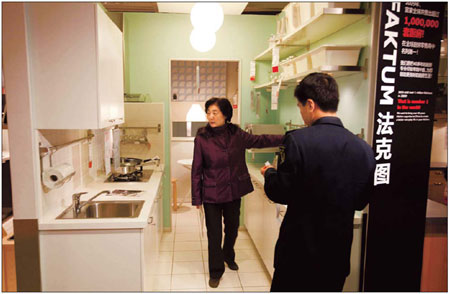Economy
Stamping personality on one's home
Updated: 2011-01-24 15:03
(China Daily)
|
 |
|
A shopper inspects a kitchen unit at an IKEA store in Beijing. An increasing number of Chinese people, especially newly-married couples, are seeking modern Western-style kitchen units made with environmentally friendly and safe materials to decorate their apartments. [Photo/Bloomberg] |
People these days demand character, fitted kitchens and walk-in closets
BEIJING - Having a walk-in closet at home like Hollywood celebrities such as Paris Hilton - who even owns a separate shoes closet - is no longer a dream for Chinese women. Demand for fittings and furniture with a personal style is booming in China.
As China's middle class grows bigger and richer, its members are looking for more ways to spend their cash.
Zhao Liang, 25, a clerk in Beijing, owns a 90-square-meter apartment in Beijing and started decorating his home in October last year. He said the big difference between his approach and how his parents' generation went about it is that he hired a home designer.
| ||||
Zhao's budget is 100,000 yuan ($15,152) including a kitchen and walk-in closet. He allowed just 5,000 yuan to fit out his bathroom but discovered this was inadequate because only high-end brands are operating in the Chinese market and they are expensive.
According to a salesman at The Home Depot furnishing market in Beijing, the price of fitting out a bathroom including a tub, a toilet, a basin and a set of taps is 15,000 yuan on average. If only foreign brands such as Kohler or TOTO are bought, the price can be anything from 20,000 to 80,000 yuan.
Zhao said it is far more than what he would like to pay just for a bathroom.
"I'd like to spend 15 percent of all my budget on the bathroom - 20,000 yuan is obviously higher than I expected," said Zhao. "Besides, I think my 5-square-meter bathroom is not big enough for a tub."
However, as for the walk-in closet, Zhao was more extravagant. He spent 50,000 yuan on it, citing a line from the Hollywood movie Sex and the City: "A walk-in closet is a little heaven for a woman."
Zhao said his wife is desperate for a walk-in closet, so he'd like to realize her dream.
They chose Boloni as their personalized provider for the "little heaven". The company provides a designer for the closet and the corresponding products. The average price is between 30,000 and 50,000 yuan. Depending on the choice of wood, the price for a 10-square-meter closet can be as much as 120,000 yuan.
"The most important things for a walk-in closet are its holding capacity and the environmental friendliness of the materials," said Zhao's wife, a 23-year-old teacher.
The custom-made furnishing industry came to China less than 15 years ago. The walk-in closet only has a five-year history in the Chinese market. According to an industry insider who preferred to remain anonymous, the year-on-year growth rate of walk-in closets is 20 percent and its market share of all kinds of closets will grow up to 70 percent in five years.
People are no longer satisfied with mass-produced furniture that lacks any personal style and practical efficiency. They are eager to make the most use of their home space, something at which the designers are specialized.
Even though the market is growing at a high speed, many manufacturers still have worries about being recognized by customers and also by incomplete regulations.
"Some Chinese furnishing manufacturers use cheap materials to make their products and sell them at a low price. It is hard for the customers to distinguish the difference (between high and low quality products) because they look the same the same. This sort of behavior has influenced the other players' market shares and blocks the healthy development of the industry," said Zhang Jing, a home designer in Beijing.
He said ownership of walk-in closets is 72 percent of households in developed countries while the number is only 6.8 percent in China. The business opportunities are there.
General furniture is gaining in popularity in the Chinese market, but there are problems. Zhai Yarong, 53, a retired engineer, said when she helped her son plan the decoration of his new apartment, she found the result was not as same as the designer's blueprint. She was told the furniture and fittings manufacturers were unable to exactly reproduce the original design.
"Our overseas designer's plan was full of ideas and creation. I liked it a lot. But in terms of the actual result, it's another story," she said.
E-paper

Ear We Go
China and the world set to embrace the merciful, peaceful year of rabbit
Preview of the coming issue
Carrefour finds the going tough in China
Maid to Order
Specials

Mysteries written in blood
Historical records and Caucasian features of locals suggest link with Roman Empire.

Winning Charm
Coastal Yantai banks on little things that matter to grow

New rules to hit property market
The State Council launched a new round of measures to rein in property prices.




